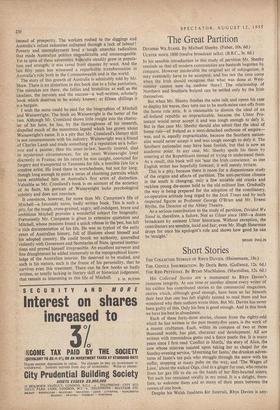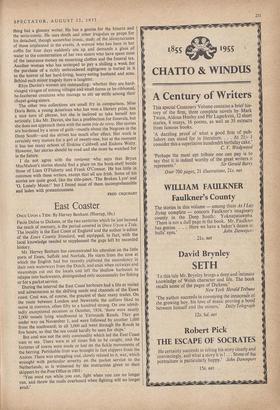Short Stories
THE COLLECTED STORIES OF RHYS DAVIES. (Heinemann, 18s.)
His Collected Stories are a monument to Rhys Davies's immense integrity. At one time or another almost every writer of his calibre has contributed stories to the commercial magazines, stories which, although good enough, have been so far beneath their best that one has felt slightly tainted to read them and has wondered why their authors wrote them. But Mr. Davies has never been guilty of this. Only his best is good enough. And in this book we have his best in abundance.
Each of these forty-three stories, chosen from the eighty-odd which he has written in the past twenty-five years, is the work of a master craftsman. Each, within its compass of two or three thousand words, has plot, character and development. All are written with tremendous gusto and a fierce poetic fire. It is many years since I first read 'Conflict in Morfa,' the story of Alice, the cow whose mistress insisted upon taking her to chapel for the Sunday-evening service, 'Mourning for lanto,' the drunken adven- tures of Ianto's ten pals who struggle through the snow with his coffin, stopping at many pubs on the way, and 'The Wages of Love,' about the wicked Olga, clad in a ginger fur coat, who returns from her gay life to die on the hands of her flint-hearted sisters. Yet each has remained vividly in my mind. It is a delight, there- fore, to welcome them and so many of their peers between the covers of one book.
Despite his Welsh fondness for funerals, Rhys Davies is any- thing but a gloomy writer. He has a genius for the bizarre and the serio-comic. He uses death and other tragedies as props for his detached, though somewhat ironic, study of the idiosyncrasies of those implicated in the events. A woman who has been in her coffin for four days suddenly sits up and demands a glass pf water to the consternation of her two sisters who have spent most of the insurance money on mourning clothes and the funeral tea. Another woman who has scrimped to pay a shilling a week for the purchaSe of a richly embroidered nightgown is buried in it to the horror of her hard-living, heavy-eating husband and sons. Behind each minor tragedy there is laughter.
Rhys Davies's women are outstanding : whether they are hard- visaged viragos of mining villages and small farms or be-ribboned, be-feathered creatures who manage to stir up strife among their chapel-going sisters.
The other two collections are small fry in comparison. Miss Doris Betts, a young American who has won a literary prize, has a nice turn of phrase, but she is inclined to take herself too seriously. Like Mr. Davies, she has a predilection for funerals, but she does not approach them with the same joie de vivre. Her stories are burdened by a sense of guilt—mostly about the Negroes in the Deep South—and she strives too much after effect. Her work is certainly very mature for a girl of twenty-one, but at the moment it has too many echoes of Erskine Caldwell and Eudora Welty. However, her stories should be read and she must be watched for in the future.
I do not agree with the reviewer who says that Bryan MacMahon's stories should find a place on the book-shelf beside those of Liam O'Flaherty and Frank O'Connor. He has little in common with these writers, except that all are Irish. Some of his stories are quite good, like the title-piece, 'The Broken Lyre' and '0, Lonely Moon!' but I found most of them incomprehensible and laden with pretentiousness.
FRED URQUHART



































 Previous page
Previous page